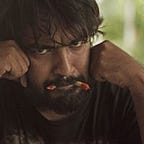Sunderbans — masked and unmasked by the tides
Here begins many a journey, some on the way back to their slowly sinking homes, some others to explore the unknowns of a delta, which conceals more than it reveals. Like, the possibility of a tiger’s eyes looking closely at you, from behind the bushes. You hear stories from the villagers of tigers pouncing on their loved ones, in the middle of the night. “They can swim well for six kilometres even,” says one of them, now a guide with us on the day trip through Sunderbans.
This day, in November 2015, began with a journey in a rickety bus from Kolkata, through rural towns filled with bikes having trailers attached to them. We arrived in a town named ‘Basanti’ in South 24 Parganas district on a pleasant evening. An auto rickshaw from here would take us to the village of Gosaba, where we met Qutub, the boat owner. Boats loaded with people, bikes, gas cylinders, children, cycles and vegetables were seen setting off to the other side.
Qutub, after some minor bargaining, put us on a boat which would take us to a village on the other side, a happening place, from where a houseboat would take us to the middle of the waters, near Pakhiralay, where we would spend the rest of the night, with the boat lolling about lightly on the calm waters and the mosquitoes keeping us company. Hours pass by on the upper deck of the boat, conversing, getting lost in the rings of smoke. It was a moonless, but starry night, with Hindustani music streaming in from one of the shores.
The young couple accompanying us disappear to the lower deck. The guy, radiating the joy of new-found love in that darkness, emerges on the upper deck, sometime later. “I proposed to her. She agreed,” he tells us. “Haven’t you rolled the joint yet?” we ask him. It takes some time for it to sink in, the import of what he told us and the laughable response that we gave him. Amends will be made later at the lower deck and with the Mughal-era cuisine (Phirni) at Arsalan back in Kolkata, the night after.
The exceedingly hot sun would wake us up as early as 7 a.m. Back to the Mainak hotel in Pakhiralay for breakfast. Mrinalkanti Mandal, the man who guided us, has been doing this since 1984. Hailing from Dayapur, he also teaches history at times. He tells us the story of two men who went out on a small to the creek to catch crabs a few days back being mauled by a tiger. We are avoiding the narrow creeks, he tells us, as if not to scare us.
A major flood, the aftermath of Cyclone Alia, had washed away many of the houses and even cows, in 2009. It is something that South 24 Parganas, one of India’s 250 most backward districts, has not fully recovered from still. Agriculture and fishing are still the mainstay here, with many migrating to Bengalore and Kerala for work.
The day spent over the waters of Sunderbans would reveal to us the unimaginable transformations on the geography as the tides change. The high tide appeared almost like a mask pulled over the landscape on either side of the waters. Trees, plants and roots lay submerged. Six hours later, we saw waters recede by afternoon, revealing the true height of the landmass. Boats found floating by the houses on the onward journey, appeared as if they were washed ashore by a wave, on to higher ground. Yet, they had not moved much from their resting spots. Only the water had moved, leaving the entire landscape half-naked. The different shades, marking the level of the water in the morning, on the stems and barks told the story of the tide eloquently.
The tiger, ever present in the stories here, but remained invisible to us through the day. The only solace being a white board on which were written the dates of tiger sightings, at one of the stopping points. The last sighting was many a week before. From the view tower was visible, the wide paths to the watering hole (of the non-liquor kind) near it, often taken by the animals. A whole army of tiny red ants were seen marching on the land where water drained off during the low tide. Other than the ants, a monitor lizard, a few deers, tiny red crabs and mud skippers that thrive in the muddy waters were the only non-humans that we would meet on this otherwise eventful day.
The watering hole
Qutub, whom we didn’t trust in the beginning, was there on the shore, waiting for our return. He turned out to be a nice guy. After taking us to a hotel in Gadkhali, where we would have our fill of chicken and fish, he went out to get tea for us from a nearby shop. He was so dependable that he even took us to the local grass man. A selfie with Qutub later, we were off to the Canning Railway Station, on the way back to Kolkata.
(The 24 hour boat ride cost the five of us a total of Rs.5500, with food included)
